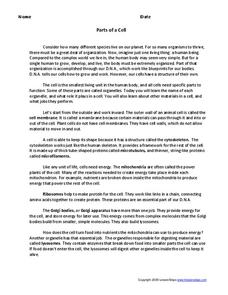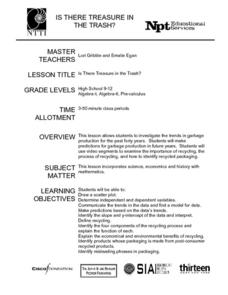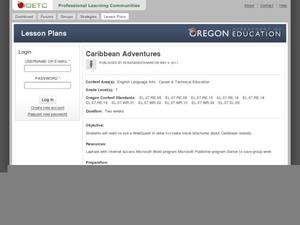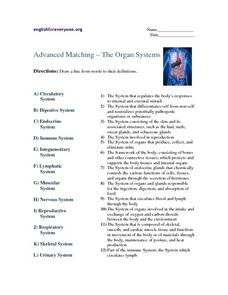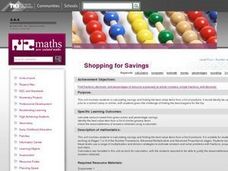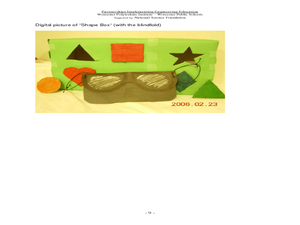Curated OER
Whales
First graders investigate two different types of whales; toothed and baleen. They describe what the different types of whale eat. They listen to a cassette of Dyan Sheldon's, The Whale Song before making stick puppets to dramatize the...
Curated OER
Tibet and the U.S.
Students examine the relationship between Tibet and the United States. They explore the political relationship between the two countries. Students identify geographical features and political boundaries of the Tibetan and Chinese regions.
Curated OER
Varied Beginnings: Research Process / Narrative Writing Techniques
What's the best way to start a story? Learners write a memoir using effective openings. They research the process and work through a list of hooks to use in their writing. They use at least two hooks to begin their personal memoir. A...
International Network on Personal Meaning
Journey of Personal Development (Part 1) – Know Yourself
Who are you? What are you? The two guiding questions found at the heart of any journey of self-discovery provide the framework for this outline of personal development seminar.
Curated OER
Parts of a Cell
Simplify the parts of a cell with this handout and brief activity. Learners read a two-page explanation of the parts of a cell that includes bolded vocabulary words. Using what they have just read, class members answer 19...
Curated OER
Is there Treasure in Trash?
More people, more garbage! Young environmentalists graph population growth against the amount of garbage generated per year and find a linear model that best fits the data. This is an older resource that could benefit from more recent...
Curated OER
The 1927 Flood
Upper elementary and middle schoolers examine the Great Flood of 1927 in the state of Arkansas. They each prepare an oral report about this flood and the huge impact it had on the economics of that time. Additionally, learners research...
Curated OER
Student Costs Data Table
Students compare and contrast two routes selected for a virtual field trip. They create a data table of educational activities, lodging, and meal costs using Microsoft Excel software.
Foreign Policy Research Institute
The People's Republic of China
This resource provides a nice framework for students to explore the perceived shift in China's policymaking from the idealogical to the practical. While this lesson includes some dated materials (2006 is the most recent...
Curated OER
A Simple Task Made Complex: Types of Sentences
Looking for a lesson about differing sentence types? Use this lesson on compound and complex sentences in your grammar unit. After composing simple, compound, complex and compound-complex sentences individually and as part of a group,...
Curated OER
Caribbean Adventures: Research and Desktop Publishing
If you want an interesting way to teach about the Caribbean that incorporates technology, this might be your answer. Class members conduct a WebQuest to gather information about Caribbean islands and create a travel brochure using...
Curated OER
The Book Thief: Discussion Questions
Expand your study of The Book Thief by Markus Zusak with a question for each level of Bloom's Taxonomy. These questions focus on part four of the novel; each is paired with at least one quote from the text for context and teacher...
Eastconn
Learning to Analyze Political Cartoons with Lincoln as a Case Study
Discover the five main elements political cartoonists use—symbolism, captioning and labels, analogy, irony, and exaggeration—to convey their point of view.
Curated OER
Advanced Matching - The Organ Systems
What's the difference between the digestive system and the endocrine system? Explore 12 body systems in this anatomy matching instructional activity, for which learners find descriptions corresponding to anatomical terminology. Some of...
New Zealand Ministry of Education
Fraction Bar
Computing class members encounter use a digital learning tool called The Fraction Bar to multiply fractions with whole numbers. They do so by finding a given fraction of a number either on a number line or by calculating the answer with...
Curated OER
Shopping for Savings
Fourth graders calculate savings and identify the best value items from a list of products. They rotate through five studying stations, completing various math activities involving calculators and solving problems related to shopping...
Curated OER
Computers Can Only Add
Students explore using mathematics to solve problems in base two. After a teacher demonstration of using base two to write numbers. students model similar problems to explore the concept of number systems in different bases. To increase...
Curated OER
Compatible numbers to 20
Students practice theories dealing with equals sign used as a balance, inequality symbols and practice utilizing a box or some other geometric shape to represent an unknown number. They assess numeracy problems embedded in language-rick...
Curated OER
Roman Empire: Physical Framework - Location, Borders, Dimensions
Students relate the classical world to the modern world. In this map skills lesson, students turn a blank map into a colorful complete map by following step-by-step directions. This lesson allows students to connect our current geography...
Curated OER
Literacy: Each One Teach One
Learners read the book, Amber on the Mountain and discuss its philanthropic implications. They determine the literacy needs of their own communities. They ask family members to complete reading recollection forms about when and how they...
Curated OER
Discovering the Northwest Territories Through the Five Themes of Geography
Students use the Atlas of Canada to find basic geographical information about the Northwest Territories.
Curated OER
More than One Way of Knowing
Pupils compare the obeservations of traditional people with the oberservations of Western science. They validate Traditional Ecological Knowledge (TEK) and Inuit Qaujimajatuqangit (IQ) through comparison and the identification of...
Curated OER
Recognizing the Importance of Sight
Students discover the true value of their senses. In this sight lesson, students discover the difficulty of life without sight by performing everyday activities without the help of their eyes. The students examine their results and the...
Curated OER
All Aboard!
Learners recognize and identify onomatopoeia. They will read the book All Aboard! A True Train Story, by Susan Kuklin. After reading the book, they list and illustrate examples of onomatopoeia. Then they write a poem or...




